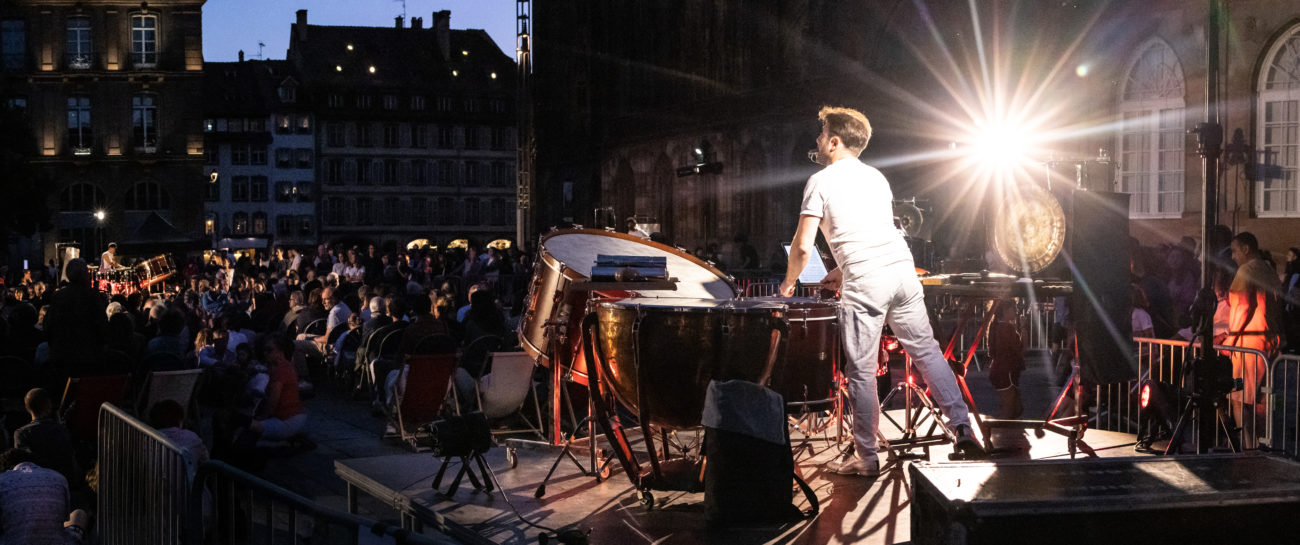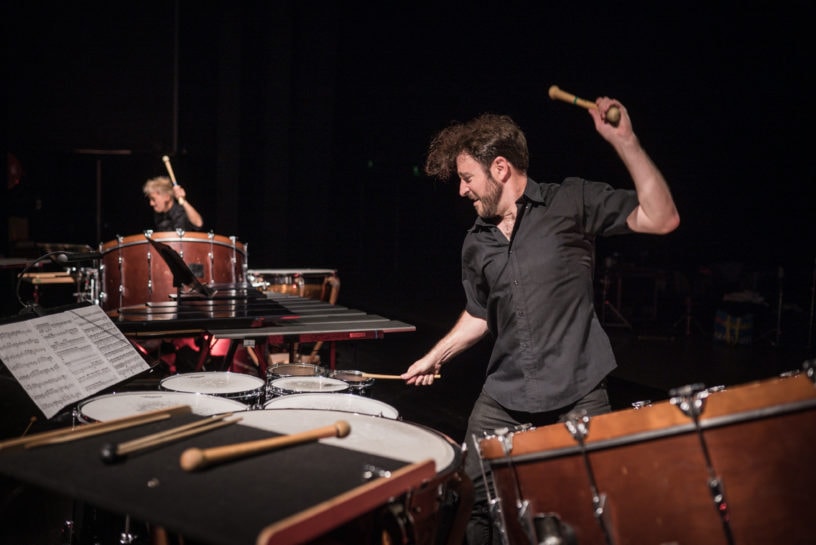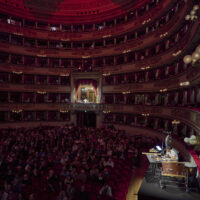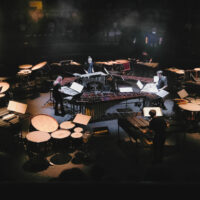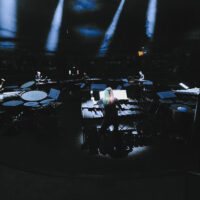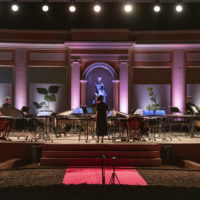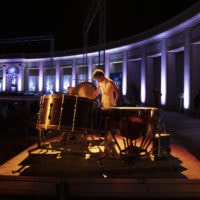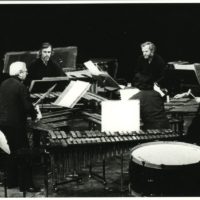It has been said several times that, thanks to percussion, Xenakis reintroduced the problem of rhythm that was thought to have disappeared from contemporary music. Architect, engineer and composer, this genius of composition writes music whose complex and harmonious structure contrasts with the explosive energy that comes out of it.
From Xenakis’ close collaboration with the Percussions de Strasbourg came two fundamental works, ten years apart: Persephassa in 1969 and Pléiades in 1979. The first, working on the spacialization of sound, is a sound choreography. The second is one of the composer’s most beautiful pieces. The richness of the timbres, the freedom and coherence of the composition make this work a unique rhythmic adventure.
In 2022, we celebrate the Centenary of the composer as well as the Sixtieth birthday of Les Percussions de Strasbourg.
Iannis XENAKIS – Pléiades (1979) 43′
break
Iannis XENAKIS – Persephassa (1969) 29′
Iannis XENAKIS – Pléiades (1979)
Commission : Ville de Strasbourg
Dédicatees : Les Percussions de Strasbourg
Re-creation : 24.06.2011 with Ensemble l’Abrupt – Alban Richard, Festival Montpellier Danse, Opéra du Rhin
Edition : Durand Salabert Eschig
Pléiades, one of the most beautiful pieces written by Iannis Xenakis. The richness of the timbres, the freedom and the coherence of the composition make this work a unique rhythmic adventure.
The Pleiades usually evoke the cluster of sparkling stars in the right shoulder of the Taurus constellation. In the northern hemisphere, the Pleiades are only visible in winter. A telescope allows us to observe dozens of stars, of which only six are visible to the naked eye, as well as a light milky fog in the same area. According to Greek mythology, this cluster of stars represents the seven sisters or Pleiades, servants of Artemis, Goddess of the Moon. One of the sisters, Electra, is said to have disappeared as a comet, eaten away with grief after the siege and destruction of the city of Troy built by her son Dardanus, victim of the famous Trojan Horse ploy. The whiteness and fog in which the Pleiades appear would be the result of the tears shed by the six sisters abandoned by Electra. Thus, the title Pléiades refers to the six members of the Percussions de Strasbourg. But for Xenakis, the reference to the multiplicity of existence seems more important.
The very essence of this piece rests on the fact that it is not limited to a simple definition. The instruments used range from keyboards (vibraphone and marimba), to various percussion instruments and the «sixxen» – a percussion instrument specially created for this composition.
The sixxen is a unique instrument which represents in itself all the idea of Xenakis’ music. It is a huge contribution to modern percussion and to musical creation in the Twentieth Century, because it first places the percussionist into the position of sound designer, producer of his own concept and sound material.
The piece is divided into four parts whose titles refer to the materials used to make the instruments and the sounds they produce: «Mélanges» performed simultaneously by various percussion instruments, then «Métaux», «Claviers» and «Peaux». Listening to the sixxen in «Métaux», one immediately thinks of the gamelan of Indonesia, especially those from Bali, the instruments used in festive music in Japan, the chimes of churches in the Mediterranean basin and the cowbells of the Alps. The richness of timbre of the sixxen is in a way an expression of the different types of life led by man, of which metals are an integral part.
While giving absolute freedom to the concept of a multiplicity of existence, Xenakis has been able to impose a rule of diversity and unity in the temporal structure of his research towards the creation of a single composition.
Iannis XENAKIS – Persephassa (1969)
Commission : French Ministry of Culture and Persepolis Festival
Dédicatees : Les Percussions de Strasbourg
Creation : 9 september 1969 at the Persepolis Festival (Iran)
Edition : Durand Salabert Eschig
Being in the heart of the sound is a dream for man, redefining its space, its distribution is a challenge for composers. In this program, the audience is the central player : the Percussions de Strasbourg musicians are on six stages all around the audience. Closing one’s eyes and getting caught up in the sound, realizing that the entire body becomes a sound sensor. Everything turns into sensations, discoveries, suspensions. An amazing sound world, much wider than what our eyes claim to see…
« Xenakis, the architect of sound, was firmly convinced that there was no justification for sound to come from only one direction. According to him, the usual arrangement of a concert, where the music comes from the front, is only one possibility among others. » Guildo Fischer
Persephassa has established itself as a definitive classic in the percussion repertoire. It was premiered in 1969 in Iran by its dedicatees, the Percussions de Strasbourg.
The title Persephassa refers to the goddess Persephone, or Kore, personification of the telluric forces and transmutations of life. These are linked to the cosmic cycles of living species and to man in particular, the basis being period, iteration, the very essence of number theory and mathematics. This is the underlying reason for the role of percussion, which also symbolized telluric and celestial activities.
At the time of its creation, Xenakis proposed new instruments, the wooden or metal simantras, already used in Orestia and whose original idea can be found in the simandres of the Greek convents, «real nests of an ancestral rhythm not yet destroyed by Radio, Television or invasions».
The 6 percussionists are placed in a ring around the audience, which is thus enclosed in these currents carried by the music. The trajectories cross or evolve according to a sound choreography staged by the composer. Before a game of increasing and decreasing waterfalls, rhythms twirling in space and chaotic clouds of sound unfolds, the sextet’s timpani rolls call Persephassa in an incantation. Through a progressive acceleration, the music will transport the audience in a gigantic whirlwind. If this «tourniquet» evokes the dance of whirling dervishes, Xenakis does not aim at trance: sudden cuts, brief but unpredictably distributed, bring the listener out of his torpor at the end.
ON TOUR:
25 July 2021: Pléiades / Persephassa – Reggia di Caserta, Naples, IT
9 July 2021: Pléiades – Plaine des Sports de Hautepierre, Strasbourg, FR
11 September 2021: Persephassa – château du Hohlandsbourg, Haut-Rhin, FR
19 March 2022: Pléiades / Persephassa – Philharmonie de Paris, FR
10 April 2022: Megaron Athens Hall, Athens, GR
12 April 2022: Thessaloniki Concert Hall, Thessaloniki, GR
9 June 2022: Pléiades – Festival 60 years of Percussions de Strasbourg – Théâtre de Hautepierre, Strasbourg, FR
10 June 2022: Persephassa – Festival 60 years of Percussions de Strasbourg – Théâtre de Hautepierre, Strasbourg, FR
24 November 2022 : Pléiades – Centre des Arts d’Enghien-les-Bains, FR
10 December 2022 : Pléiades – St Helena Church, Bonn, DE
3 April 2023 : Pléiades – Theater Carlo Felice, Genova, IT
26 May 2023 : Pléiades, extracts – Taïwan International Percussion Convention, Taipei, TW
24 May 2024 : Pléiades / Persephassa – Festival Milano Musica, Theater alla Scala, Milan, IT
18 June 2024 : Pléiades, Festival Les Flâneries Musicales, Cirque du Manège, Reims, FR
And many more to be announced…
BOOKLET-CD RELEASE – XENAKIS: PLÉIADES & PERSEPHASSA
2022 marks the centenary of the birth of Iannis Xenakis, who was probably one of the most beautiful encounters ever for the Percussions de Strasbourg, as well as the 60th anniversary of our ensemble. For this occasion, we wanted to re-record the two fundamental works for percussion, Pléiades and Persephassa, and to create a unique object that brings together not only our music, but also texts and iconography recounting this prolific collaboration.
“This recording in itself defines the ensemble in its cohesion, its willingness, its imagination, its enthusiasm and its talent. Between the historical recordings of the 1970s and today, there is only one short step, which builds on those trodden by the four generations that have played a part in this wild adventure, one further step like a baton passed down from generation to generation, if only to ensure that the movement initiated by all the composers who have written for the Percussions de Strasbourg, Iannis Xenakis high among them, will never stop.”
Jean Geoffroy
Album selected France Musique available here
THE PRESS SPEAKS OUT
La Croix – Bruno Serrou, February 25, 2022
A centenary for a sixtieth anniversary… In order to celebrate their 60 years of existence, the Percussions de Strasbourg release a great record, fully Xenakis. The band performs Pléiades and Persephassa, the latter – known for its cinematographic sound quality – having been ordered by the Percussions de Strasbourg in 1968. Eight years later, a new order will come : Xenakis would then deliver his fabulous Pléiades, whose sophistication and inspiration are simply stunning.
Le Monde – Pierre Gervasoni, February 28, 2022
Hsin-Hsuan Wu, a young Taiwanese woman who joined the prestigious Percussions de Strasbourg in 2017, perceives the record differently. “To me, Pleiades could be seen as six stars travelling across a galaxy” she confesses, while « it’s the voice of the Earth that’s rising from Persephassa” , the other piece for six percussions sets, which has been masterfully restituted by the Percussions de Strasbourg in the CD-Booklet that commemorates their sixitieth anniversary, in 2022.
Le Figaro — Thierry Hillériteau, February 11, 2022
The sixtieth anniversary of the Percusssions de Strasbourg. The band, as a loyal collaborator and servant of Xenakis’ music since the 1970s, celebrates the composer’s genius and its 60 years of creation in a magnificent CD-Booklet, which is dedicated to Pléiades and Persephassa (Outhere Music).
Resmusica — Michèle Tosi, February 12, 2022
The team has been completely renewed but the two pieces, Persephassa (1969), and Pléiades (1979), are inscribed inside the phalanx’s repertoire. They have often been played and played again, and have been recorded several times, with this “evolution of how a score is viewed”, evoked by distingued percussionist Jean Geoffroy in the pages of the CD-booklet. But this evolution also palpable through the masterful and skilful playing of the instruments with which, forty years later, the six musicians tackle the two scores.
Cadences — Élise Guignard, March 2022, issue #352
Since 1962, the Percussions de Strasbourg have been playing a proeminent role in the world of musical creation.
Crescendo — Alex Quitin, Februrary 16, 2022
The record is a real achievement. After all, what better band to play Persephassa and Pléiades than the Percussions de Strasbourg themselves? The playing is clear, the nuances have been pushed to the limits, the rhythms are precise… They are percussionists of great talent and experience, and the virtuosity that they deploy in some passages on the score is breahtaking. They are taking us through an astounding journey of sounds and pay tribute to Iannis Xenakis.
France Musique — January 28, 2022
The story of an exceptional encounter between a composer and a band.
ConcertClassic.com — Alain Cochard, March 15, 2022
“The truth remains that if there were one French band that would dominate all the others for this Xenakis celebration, it would be without a doubt the Percussions de Strasbourg.” […] With 400 pieces created within sixty years, the band can boast about having written an essential and truly groundbreaking chapter of the History of Music.”
“As a complete musical as well as editorial achievement, the CD-booklet, which was released a few weeks ago reunites Pléiades and Persephassa […] With Franck Rossi alonsgisde Jean Geoffroy for the mixing and the sound editing, the Xenakis record of the Percus establishes itself among the greatest releases of the beginning of this year, and promises to stay a reference for a very long while.”

